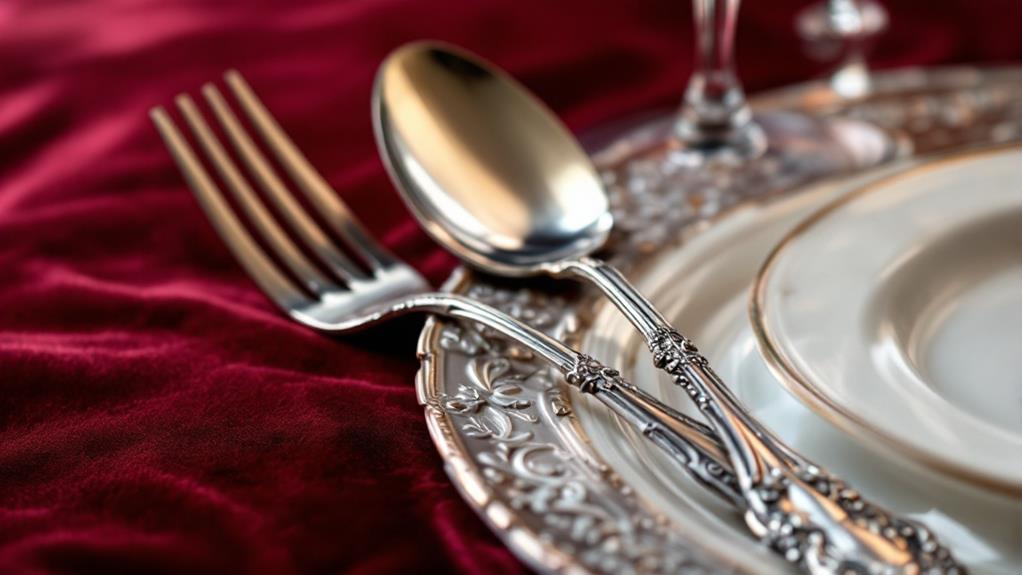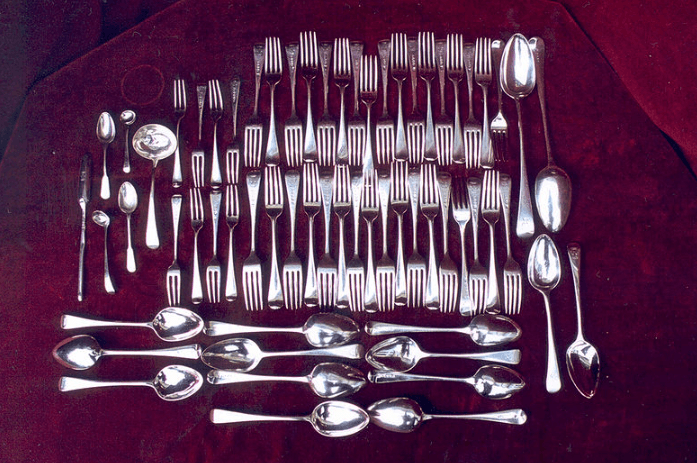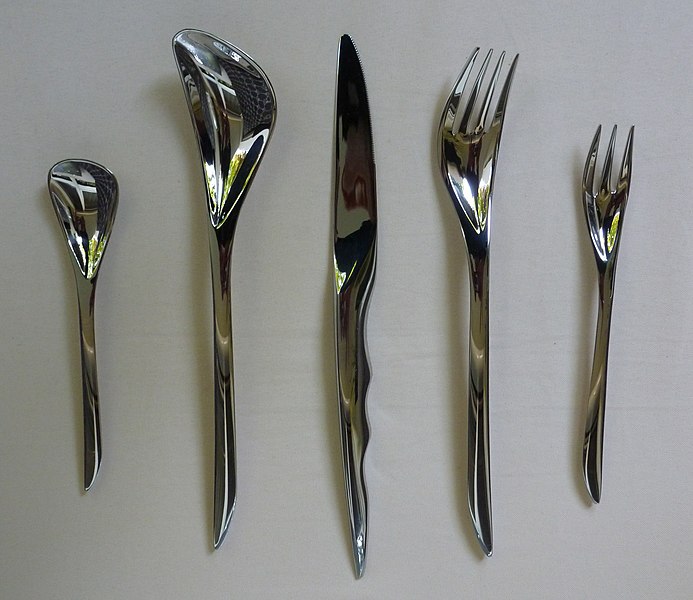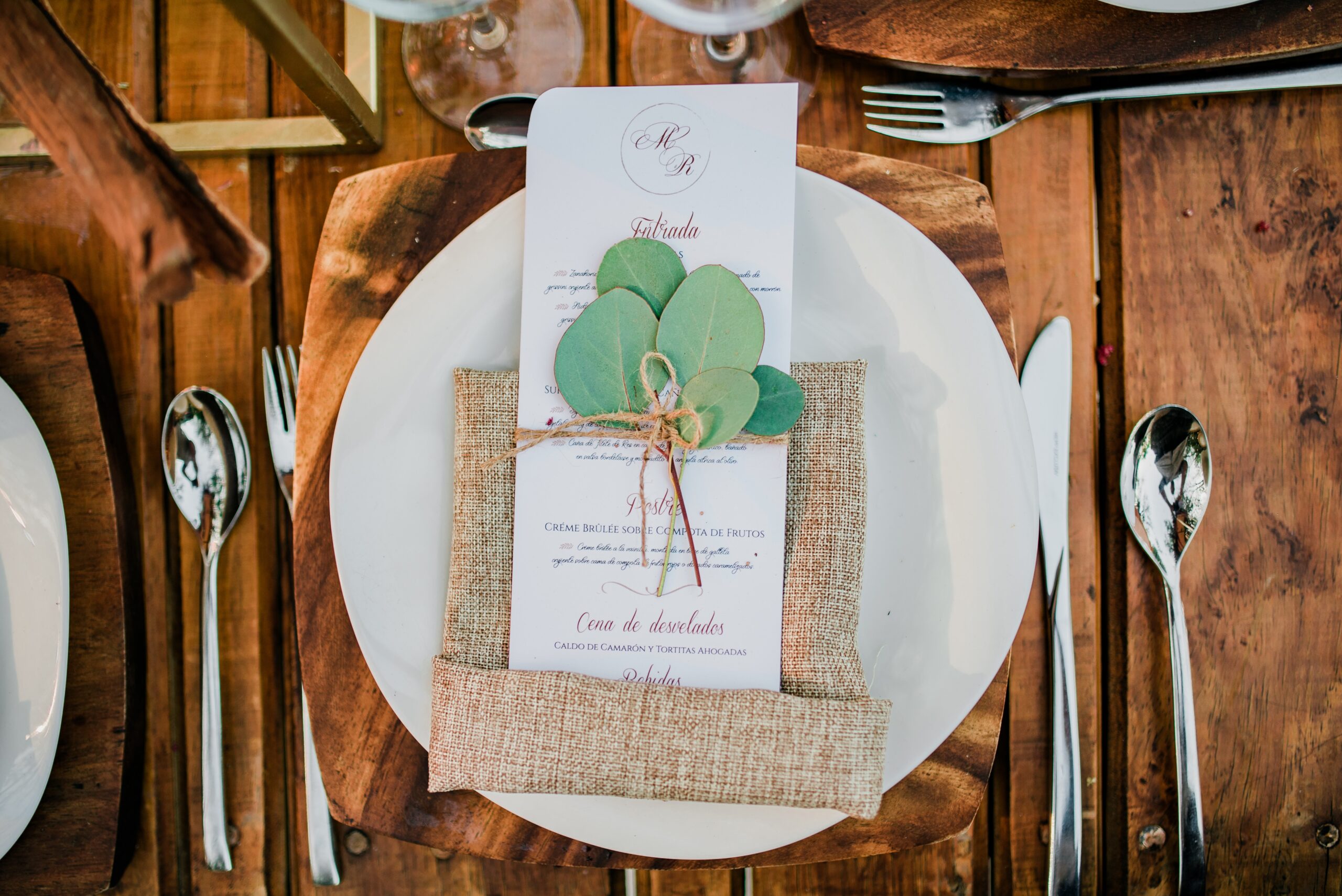What Kind of Soap Do You Use With a Washboard?
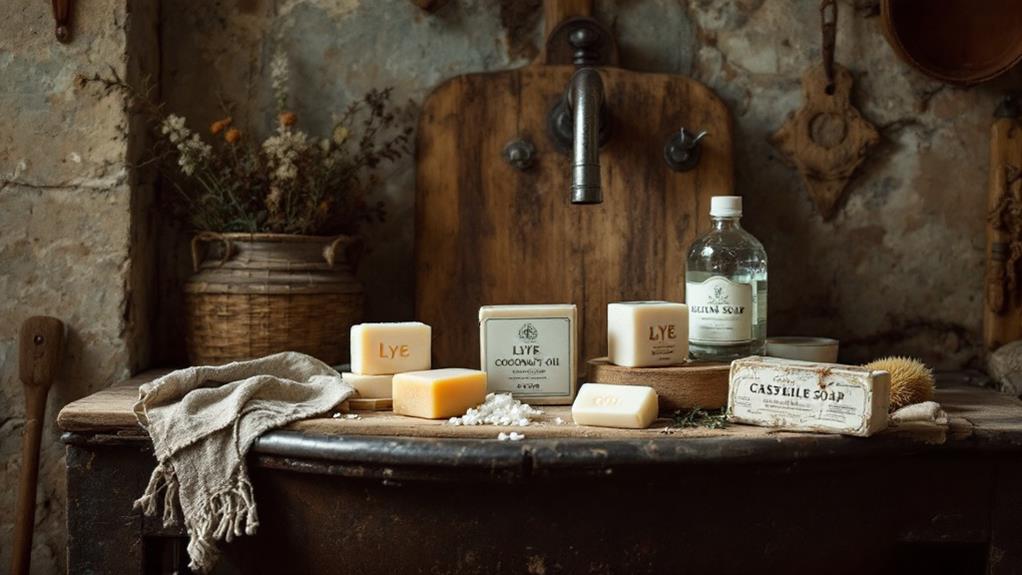
When using a washboard, you'll want a tough, high-alkaline bar soap that can tackle stubborn stains and create a thick lather for scrubbing. Traditional homemade lye soaps or animal fat-based options work well, as do vegetable-based Castile or Marseille soaps. Avoid liquid detergents and harsh chemicals like bleach or phosphates. Instead, opt for natural ingredients like olive oil, coconut oil, or tallow. You can even make your own soap by combining lye with animal fat or vegetable oils. Remember to rinse clothes thoroughly after scrubbing. With the right soap choice and technique, you'll become an expert in the art of washboard laundry in no time.
Traditional Soap Types
Washboards of yesteryear relied on simple, homemade soaps that packed a powerful punch. These traditional soaps were often crafted using basic ingredients readily available to households. Animal fat and lye were the primary components, resulting in a potent cleaning agent that could tackle even the toughest stains.
Homemade lye soap was a popular choice for washboard laundry. While effective, it could be harsh on your hands due to its high alkalinity. You'd often find these soaps with a raw, irregular appearance, unlike the smooth, uniform bars you're accustomed to today. Despite their rough look, these soaps were incredibly durable, sometimes lasting for decades without losing their cleaning power.
To create washboard soap, you'd typically pour the mixture into pans and let it set. Once hardened, you'd cut it into blocks for easy use on the washboard. This method allowed for customization in size and shape, making it convenient for different laundry needs. While these traditional soaps might seem primitive by today's standards, they were highly effective for their time and purpose.
Castile and Marseille Soaps
Soap enthusiasts seeking a gentler alternative for washboard laundry often turn to Castile and Marseille soaps. These vegetable-based options offer a powerful yet mild cleaning solution for your wash board routine.
Castile soap, typically made from olive oil, provides an effective and gentle way to hand wash your clothes. Its plant-based formula creates a rich lather that helps you tackle stubborn stains as you scrub. Similarly, Marseille soap, a traditional French product, boasts a hard texture and impressive cleaning power when used with a washboard.
Both Castile and Marseille soaps are free from harsh chemicals, making them ideal for delicate fabrics and sensitive skin. You'll find that these soaps create a thick, long-lasting lather that cuts through dirt and grime as you work the fabric against the wash board.
Bar vs. Liquid Soaps
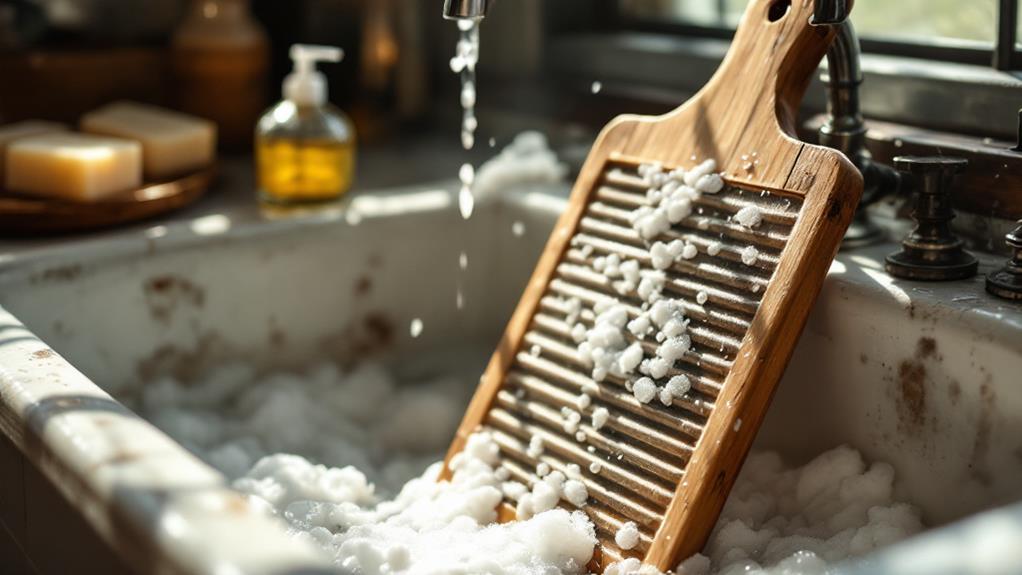
Choosing between bar and liquid soaps for your washboard can considerably impact your laundry routine. When it comes to hand washing with a washboard, bar soaps are the clear winner. They're specifically designed to work well with the grooved surface of the washboard, providing an effective cleaning action.
Here's why bar soaps are superior for washboard use:
- They can be directly rubbed onto the washboard's grooves
- They create a concentrated abrasive surface
- They have high alkalinity, which helps lift stubborn stains
- They're designed for manual scrubbing
Liquid detergents, on the other hand, tend to disperse in water, making them less suitable for washboard use. They don't provide the same concentrated cleaning power that bar soaps offer.
When selecting a bar soap for your washboard, you have several options. Traditional homemade lye-based soaps work exceptionally well, offering a strong cleaning action. Commercial laundry bars formulated for hand washing are also an excellent choice, as they're specifically designed for manual scrubbing. These soaps, combined with the washboard's scrubbing action, will effectively tackle even the toughest stains, making your hand wash laundry routine more efficient and successful.
Natural Soap Ingredients
When considering natural soap ingredients for your washboard, you'll find a wide range of options that can be both effective and gentle on your clothes and hands. Natural handmade soaps often contain olive oil and coconut oil as base ingredients, which provide excellent cleaning power while being mild on fabrics. These oils are combined with lye to create a saponification process, but the resulting soap is much gentler than pure lye-based versions.
For those who prefer a harder, longer-lasting bar for laundry by hand, traditional recipes sometimes incorporate animal fats like tallow or lard. However, if you're looking for a milder option for your wash day, stick to vegetable oil-based soaps. These are ideal for hand washing delicate pieces of clothing.
To tackle stubborn stains on wash day, consider soaps with added exfoliants like ground oats or pumice. These can help you scrub effectively when using hot water on your washboard. After washing, rinse your clothes in clear water to remove any soap residue. Remember, when using a washboard, simple, all-natural ingredients are often the best choice for keeping your clothes and hands in good condition.
Harsh Chemicals to Avoid
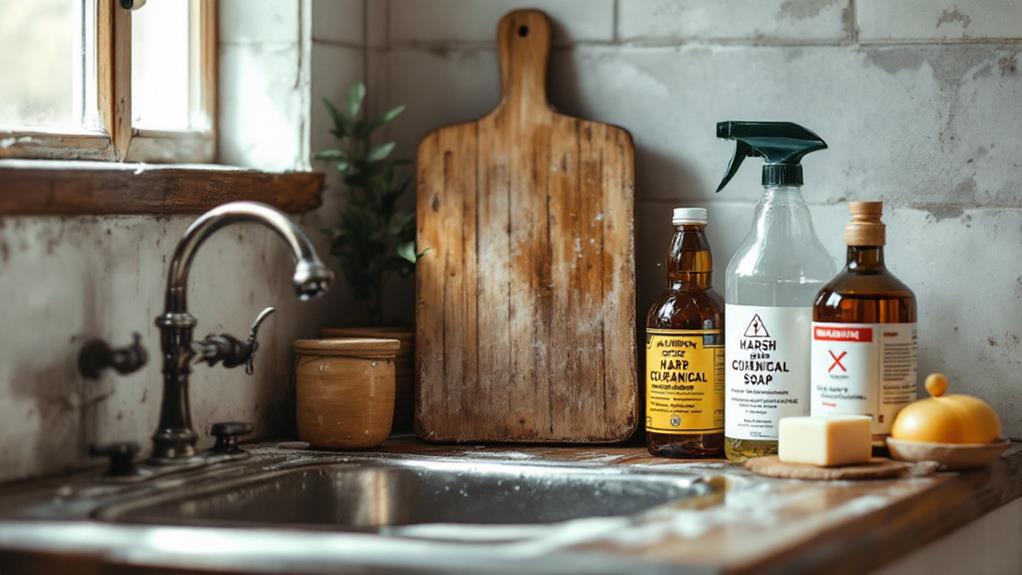
For washboard laundry, it's crucial to steer clear of harsh chemicals that can damage both your clothes and skin. While commercial laundry detergents may be convenient for modern washing machines, they're often too harsh for traditional washboard use. These detergents typically contain ingredients that can be harmful when used with the vigorous scrubbing action of a washboard.
When choosing soap for your washboard laundry, avoid products that contain:
- Bleach
- Phosphates
- Synthetic fragrances
- Optical brighteners
These chemicals can irritate your skin, weaken fabric fibers, and even cause discoloration. Instead, opt for gentler alternatives that are more suitable for hand washing. Natural soaps, such as castile or those made with animal fats and essential oils, are excellent choices. They're effective at cleaning without the harsh side effects of modern detergents.
If you're looking to enhance cleaning power without resorting to plastic laundry detergents, consider adding washing soda or borax to your natural soap. These natural additives can improve the soap's ability to remove dirt and stains while still being gentle on your clothes and skin during the washboard scrubbing process.
Homemade Soap Recipes
Soapmakers have long known that homemade soap is ideal for washboard laundry. If you're looking to create your own soap for this purpose, you'll find that traditional recipes often use simple ingredients like animal fat or vegetable oils combined with lye. These homemade soaps are particularly effective for cleaning heavy items on a washboard.
To make your own soap, you'll need to mix the fat or oil with lye carefully, as lye can be harsh on the skin. Once you've combined the ingredients, pour the mixture into a pan and allow it to harden. After it sets, cut the soap into blocks for easy use. Keep in mind that homemade soap typically has a raw, irregular appearance compared to commercial varieties.
While homemade soap can be more abrasive than store-bought options, it's highly effective for washboard laundry. Even older homemade soaps, like those preserved for decades, can still work well. However, remember to rinse your clothes thoroughly after scrubbing to remove any residual lye that could irritate your skin. With proper preparation and handling, your homemade soap will be an excellent tool for tackling laundry on a washboard.
Soap Application Techniques
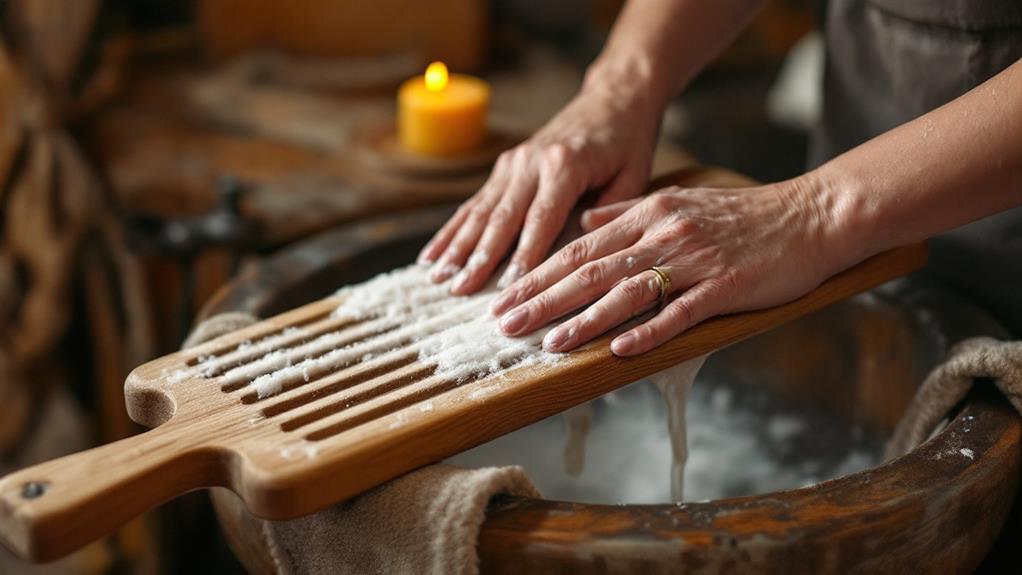
Now that you've prepared your soap, it's time to become proficient in the art of applying it to your washboard. The key is to rub the soap directly onto the washboard, guaranteeing some remains in the grooves. This creates the perfect lather for scrubbing clothes effectively. Remember, it's essential to avoid applying soap directly to your clothing, as this can lead to excess suds and potential fabric damage.
When using traditional lye-based soaps, like Elmer Hardy's homemade version, you'll find they're well-suited for washboard use. However, be mindful of their harsh nature on your hands. To safeguard yourself:
- Take frequent breaks during washing
- Moisturize your hands regularly
- Wear gloves if possible
- Rinse your hands thoroughly after use
To remove as much dirt and grime as possible, you'll often need to repeat the washing and rinsing process multiple times. This is especially true for stubborn stains. Be patient and persistent in your efforts. By conquering these soap application techniques, you'll guarantee your clothes come out clean and fresh, while also preserving the integrity of your fabrics and protecting your hands.
Fabric-Specific Soap Choices
When choosing soap for your washboard, it is crucial to take into account the specific fabrics you're cleaning. Different materials require different types of soap to guarantee effective cleaning without damaging the fibers.
For delicate fabrics like silk or wool, you'll want to opt for a gentle soap that won't cause excessive wear. Castile soap is an excellent choice for these materials, as it's mild yet effective at removing dirt and grease. You can use it in liquid form or grate a bar directly onto the washboard for extra scrubbing power.
For tougher fabrics like denim or work clothes, you might consider using a lye-based homemade soap. While it's harsher on clothing, it provides a deep clean that's often necessary for heavily soiled items. However, use caution and test it on a small area first to avoid damaging the fabric.
Specialty laundry soaps formulated for hand washing are also great options for most fabrics. They're designed to work well with washboards and minimize wear and tear. For a versatile solution, consider using soap flakes or powders dissolved in the wash water. These can be adjusted based on the fabric type and level of soiling.
Environmental Impact of Soaps
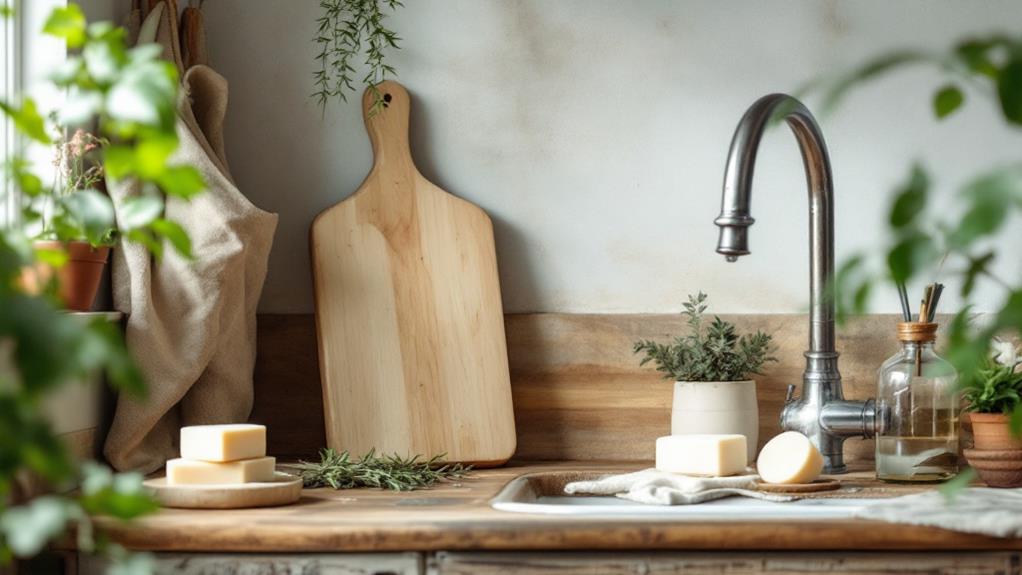
The environmental impact of your soap choice extends far beyond your washboard. When selecting a soap for your laundry needs, it's essential to take into account its effect on ecosystems and sustainability. Traditional lye-based soaps can be harsh on the environment due to their high pH levels, potentially disrupting aquatic life. Instead, opt for plant-based, biodegradable soaps with natural oils and minimal synthetic additives to reduce your environmental footprint.
Cold-process handmade soaps often contain fewer synthetic preservatives and fragrances compared to mass-produced varieties, making them a more eco-friendly choice. You'll also contribute to reducing plastic waste and microplastic pollution by choosing bar soaps over liquid detergents.
To further minimize your soap's environmental impact, contemplate the following:
- Look for certified organic, fair-trade, or eco-friendly labels
- Choose soaps with minimal packaging
- Avoid products containing microbeads or harsh chemicals
- Support local soap makers who use sustainable practices

